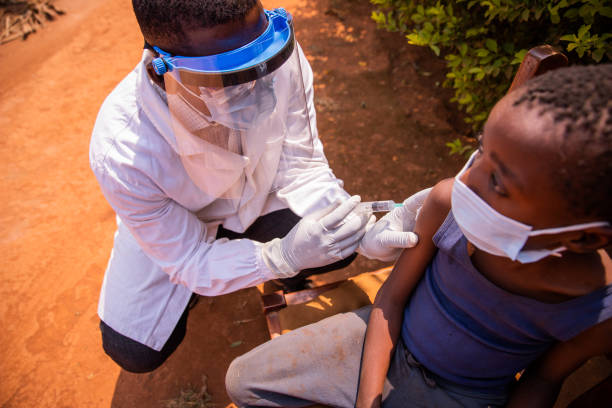What Are the Symptoms of Cholera?
Symptoms of Cholera
Cholera is a highly contagious bacterial infection caused by consuming contaminated food or water. It primarily affects the intestines and can lead to severe dehydration and, in extreme cases, death if not treated promptly. Cholera is a serious public health concern in many parts of the world, especially in areas with poor sanitation and limited access to clean water.
In this article, we’ll explain the causes, symptoms, and what you should do if you suspect you have cholera. If you experience any symptoms, it’s crucial to seek professional medical help immediately. You can consult a doctor via the Virtual Doctors App or download the Virtual Doctors Healthplus App on Google Play to schedule an appointment.
Symptoms of cholera: what causes cholera
Cholera is caused by a bacterium called Vibrio cholerae. This bacterium produces toxins in the intestines, leading to severe diarrhea and dehydration. Cholera is mainly transmitted through:
- Contaminated Water or Food: The most common source of cholera is drinking water or eating food that has been contaminated with the cholera bacteria. This is more likely in areas where sewage treatment is inadequate or where clean drinking water is scarce.
- Poor Sanitation: Cholera thrives in places with poor sanitation, such as refugee camps or areas affected by natural disasters, where access to clean water and proper sewage disposal is limited.
- Person-to-Person Transmission: Although less common, cholera can also spread through direct contact with an infected person’s stool or vomit.
Who Is Most at Risk?
People living in areas with limited access to clean water and sanitation are most at risk of cholera. Travelers to regions where cholera outbreaks are common should take precautions by avoiding unsafe food and water.
What Are the Symptoms of Cholera?: Causes of cholera
Cholera can cause symptoms ranging from mild to severe, depending on the individual and the severity of the infection. In some cases, people infected with cholera may not experience any symptoms, but they can still spread the bacteria to others. Here are the most common symptoms of cholera:
1. Watery Diarrhea
The most significant and dangerous symptom of cholera is severe watery diarrhea. The diarrhea is often described as “rice-water stools” because it looks like water that has been used to rinse rice. It can come on suddenly and lead to massive fluid loss in a very short time.
2. Dehydration
Because of the severe diarrhea, individuals with cholera often experience rapid and extreme dehydration. Dehydration symptoms include:
- Dry mouth and throat
- Excessive thirst
- Sunken eyes
- Lack of tears
- Low urine output or dark yellow urine
- Rapid heartbeat
If dehydration is not treated immediately, it can lead to shock, kidney failure, or even death.
3. Vomiting
Frequent vomiting is another common symptom of cholera. Like diarrhea, vomiting can also lead to significant fluid loss, worsening the risk of dehydration.
4. Muscle Cramps
As the body loses fluids and electrolytes (salts), muscle cramps can occur. These cramps can be painful and are a sign that the body is losing important nutrients through diarrhea and vomiting.
5. Weakness and Fatigue
Because cholera causes rapid fluid loss, individuals can feel extremely weak and tired. This weakness can worsen as dehydration progresses, making it difficult to carry out even basic tasks.
When to Seek Medical Help
Cholera is a medical emergency that requires immediate treatment. If you or someone you know experiences severe diarrhea, vomiting, or dehydration, seek help right away. Cholera can become life-threatening in just a few hours if left untreated, particularly for children and older adults who are more vulnerable to rapid fluid loss.
If you suspect you have cholera, consult a doctor through the Virtual Doctors App or download the Virtual Doctors Healthplus App on Google Play to get prompt medical advice and treatment.
How Is Cholera Treated?
The key to treating cholera is rehydration. Here are the main steps to manage cholera:
- Oral Rehydration Solution (ORS): The first line of treatment for cholera is rehydrating the body with ORS. This solution contains water, salts, and sugar to help replace the fluids and electrolytes lost due to diarrhea and vomiting.
- Intravenous Fluids: In severe cases where oral rehydration is not sufficient, intravenous fluids may be necessary to restore lost fluids quickly.
- Antibiotics: In some cases, doctors may prescribe antibiotics to reduce the severity and duration of the illness. Antibiotics help fight the bacterial infection, but they are only used for severe cases of cholera.
- Zinc Supplements: For children, zinc supplements can help reduce the severity of diarrhea and speed up recovery.
How to Prevent Cholera
Preventing cholera is crucial, especially in areas where outbreaks are common. Here are some effective ways to avoid cholera:
- Drink clean, boiled, or bottled water.
- Avoid eating raw or undercooked food, especially seafood.
- Wash your hands regularly with soap and water, especially after using the bathroom or before eating.
- Use proper sanitation methods to dispose of human waste and keep your environment clean.
Cholera is a severe but preventable disease. Recognizing the symptoms and seeking immediate treatment can save lives. If you or someone you know experiences symptoms of cholera, such as severe diarrhea, vomiting, or dehydration, consult a healthcare provider without delay.
To get professional medical advice and treatment, book an appointment with a qualified doctor on the Virtual Doctors App or download the Virtual Doctors Healthplus App on Google Play. Early treatment can prevent life-threatening complications and help you recover quickly.


